KARTARPUR: Pakistani officials spearheading the Kartarpur corridor project announced on Monday that the first phase of the estimated $100 million multi-purpose Gurdwara Darbar Sahib complex and the border crossing was ready and the authorities were prepared to welcome Sikh pilgrims ahead of the 550th birth anniversary of the founder of their faith, Guru Nanak.
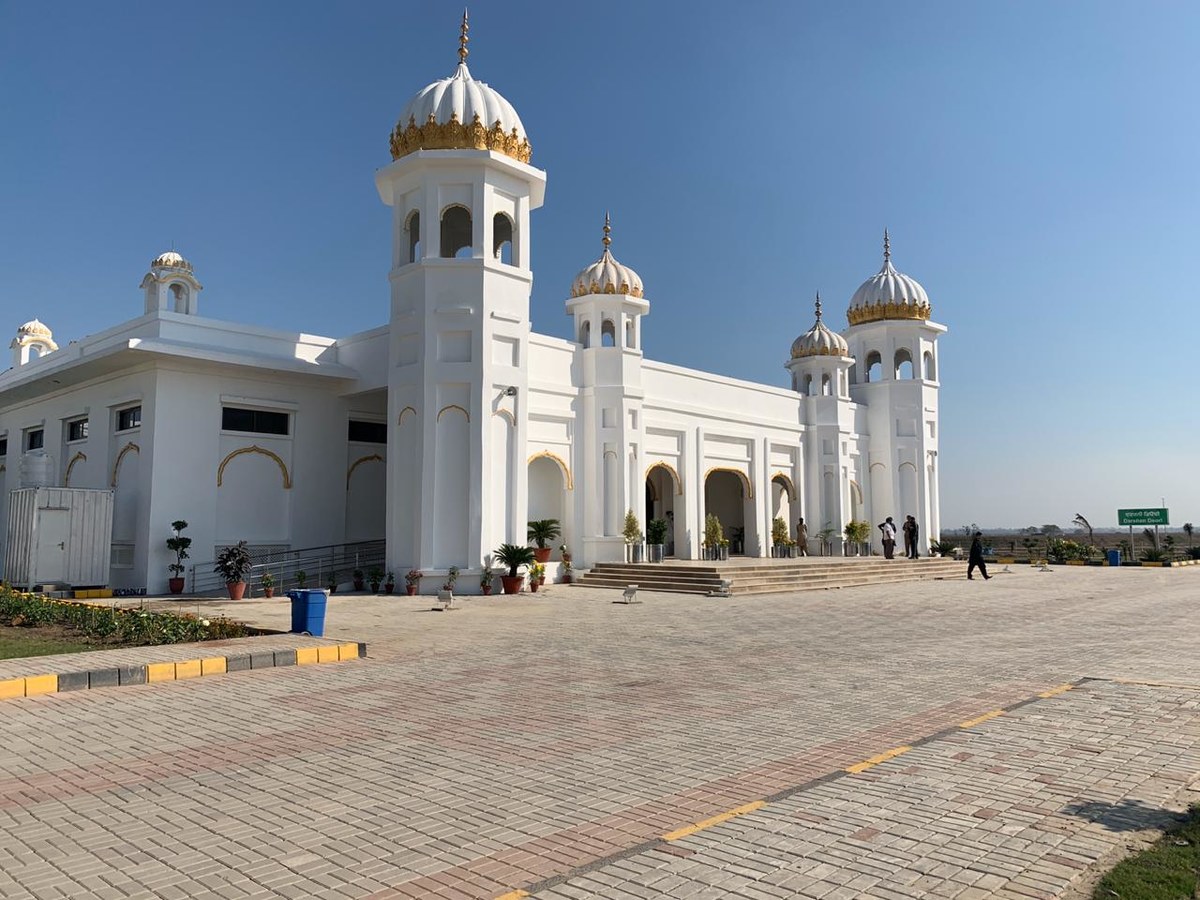
Gurdwara Darbar Sahib - From a 2-acre Gurdwara complex post-partition, originally 44 acres pre-partition to a 102 acre total covered area dedicated for the shrine and corridor. (AN Photo by Sib Kaifee)
“This project is unique,” project director Brig. Atif Majeed told Arab News during the tour of the complex. “We worked on it 24/7 in three shifts and completed it in a small period of 10 months.”
Sikh worshippers from around the world began arriving in Pakistan days before the corridor’s inauguration by Prime Minister Imran Khan which is scheduled for November 9.
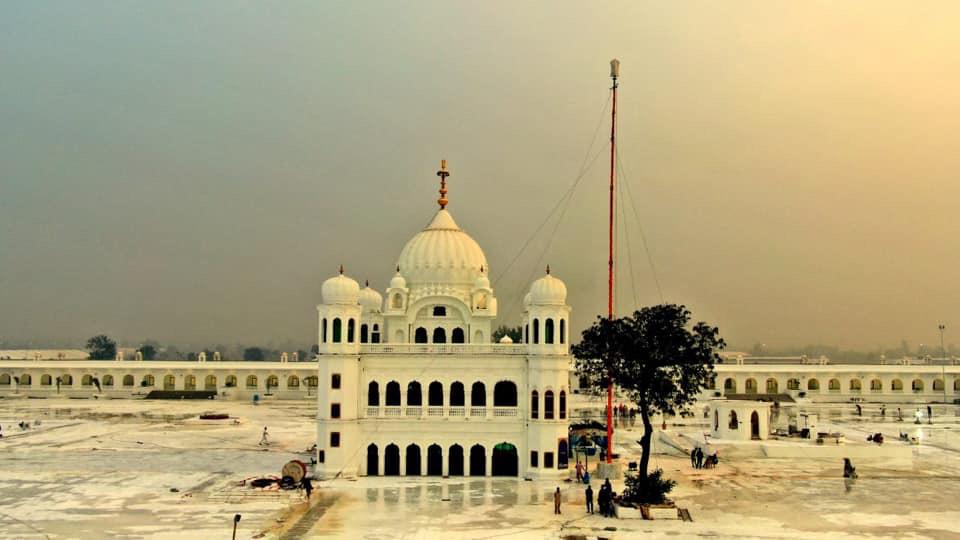
Gurdwara Darbar Sahib - From a 2-acre Gurdwara complex post-partition, originally 44 acres pre-partition to a 102 acre total covered area dedicated for the shrine and corridor. (AN Photo by Sib Kaifee)
The corridor is designed to connect the Sikh shrines of Dera Baba Nanak Sahib in India’s Punjab province to Gurdwara Darbar Sahib in Pakistan’s Kartarpur, a small town located 125 km northwest of Lahore and only four kilometers from the Indian border.
“I would like to thank the people of Pakistan and Prime Minister Imran Khan for opening doors to Baba Guru Nanak’s shrine in 11 months,” said a first-time visitor, Kamal Dev Singh, a Sikh pilgrim who arrived on Monday from Australia with his son to worship.
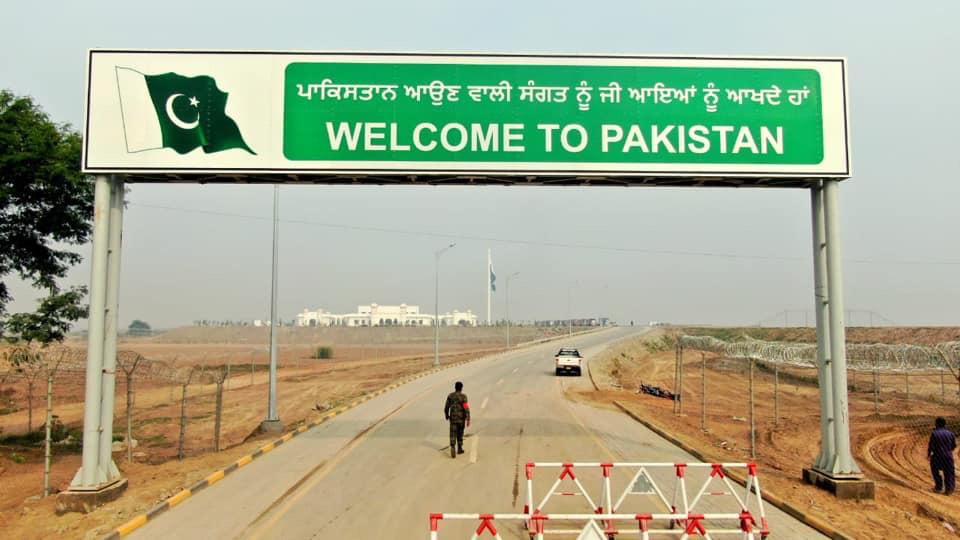
Gurdwara Darbar Sahib - From a 2-acre Gurdwara complex post-partition, originally 44 acres pre-partition to a 102 acre total covered area dedicated for the shrine and corridor. (AN Photo by Sib Kaifee)
He said that the joint initiative of India and Pakistan to undertake the construction of the corridor in a tense geopolitical environment “is a starting point for peace and harmony” between the two countries.
Construction began shortly after Khan laid the foundation stone last year on November 28, 2018, two days after the project was inaugurated on the Indian side. Despite tensions between the two South Asian nuclear neighbors, both countries jointly completed the project in their respective territories.
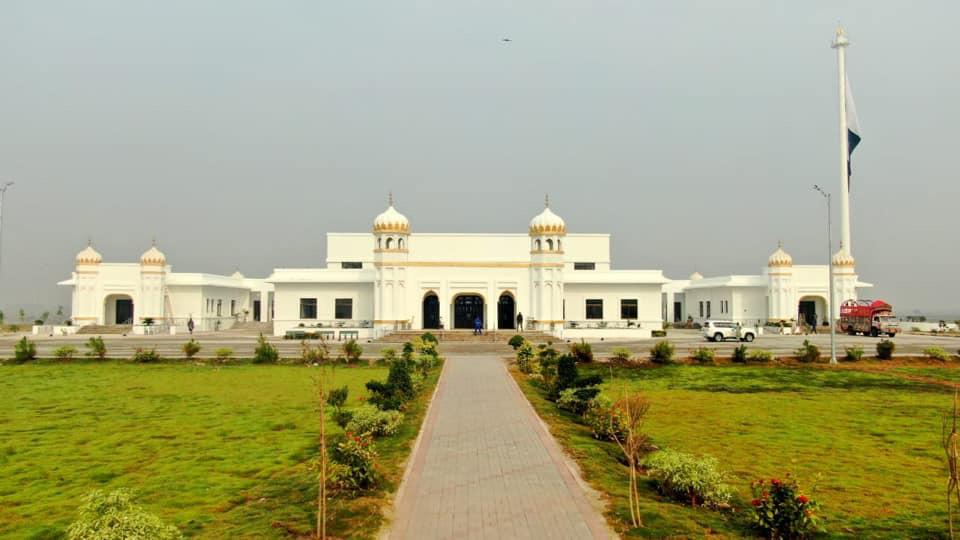
Gurdwara Darbar Sahib - From a 2-acre Gurdwara complex post-partition, originally 44 acres pre-partition to a 102 acre total covered area dedicated for the shrine and corridor. (AN Photo by Sib Kaifee)
The two countries currently have tense diplomatic relations with bilateral trade and travel cut off after India abolished the special constitutional status of the disputed Kashmir valley under its administrative control.
Pakistan reacted by expelling the Indian ambassador and imposing trade embargo. The two South Asian neighbors claim Kashmir in full but control it in part, having fought full-scale wars over it.
The mega construction project which Pakistan accomplished in nine months was expected to take between three to five years.
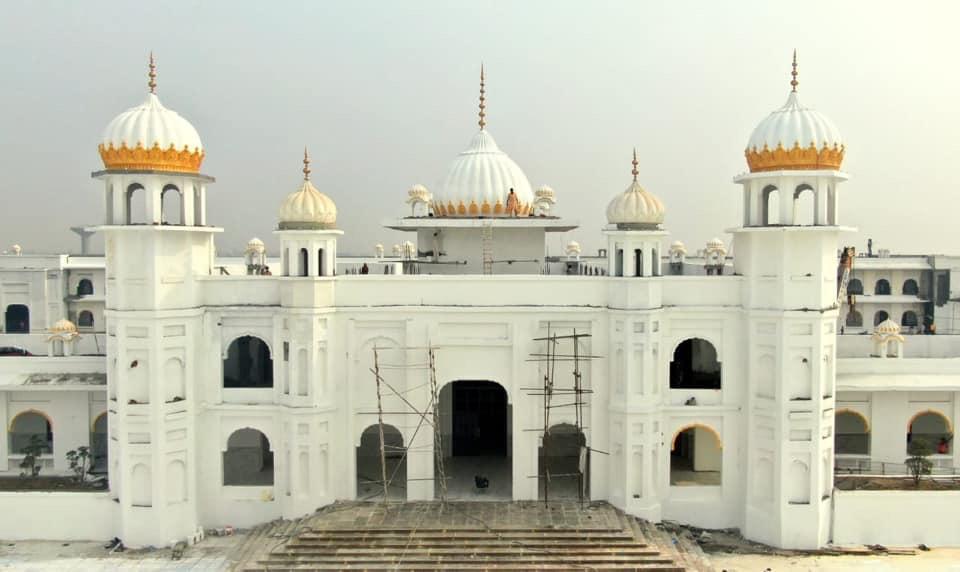
Gurdwara Darbar Sahib - From a 2-acre Gurdwara complex post-partition, originally 44 acres pre-partition to a 102 acre total covered area dedicated for the shrine and corridor. (AN Photo by Sib Kaifee)
Praising Pakistan’s “incredible job” of swift construction, an American Sikh, Diljit Singh, told Arab News that he had not gone to his “home country India in 27 years” but decided to come to Pakistan “since I felt it is my own land.”
“Within a small period of time, the Pakistan government did a very good job of constructing the complex and I will tell all the Sikhs to avail the opportunity to visit this place,” he said.
The corridor will facilitate a visa-free movement for pilgrims crossing the border checkpoint from India, who will have to obtain a permit to visit Kartarpur Sahib which was established in 1522.
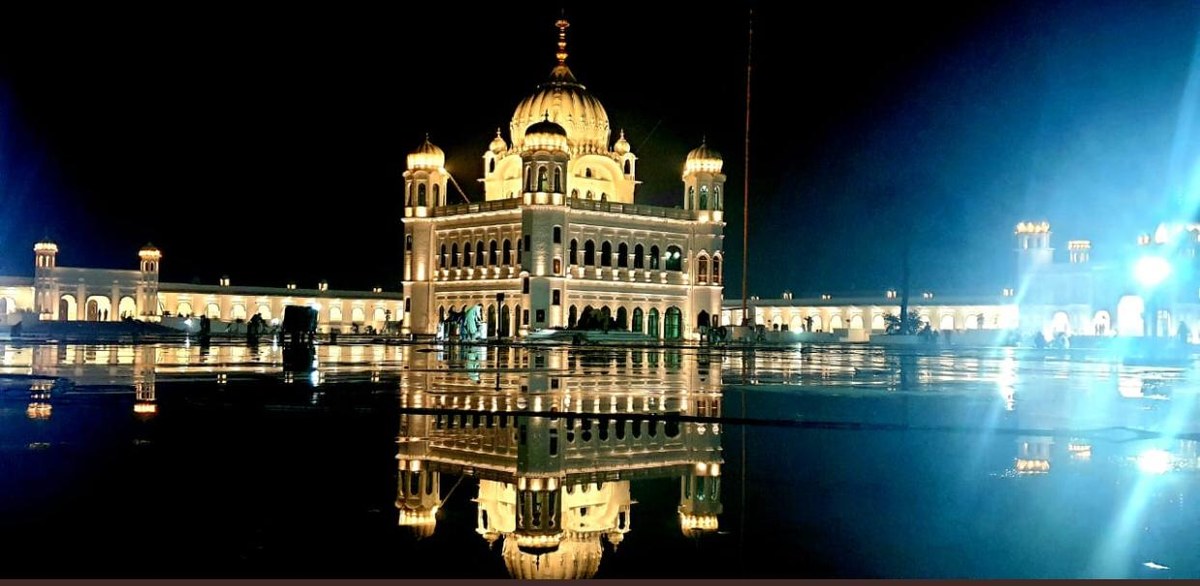
Gurdwara Darbar Sahib - From a 2-acre Gurdwara complex post-partition, originally 44 acres pre-partition to a 102 acre total covered area dedicated for the shrine and corridor. (PID Twitter account)
Khan announced last week that “Sikhs coming for the pilgrimage to Kartarpur from India” would not need a passport, “just a valid identification.”
The $20 fee to cover facilitation and administration costs has also been waived for pilgrims arriving on the inauguration day and on Sikhism’s most sacred festival marking Guru Nanak’s birth anniversary.
Pakistan will facilitate the visa-free travel of 5,000 pilgrims arriving through the Kartarpur corridor on a daily basis. Sikhs and Guru Nanak’s followers will be allowed worship till the complex, which has a free food banquet hall for over 2,000 people, tent village accommodation for up to 10,000 guests, locker and shoe storage room, medical center, museum, IT center, money exchange booths, shopping kiosk, makeshift admin camp office, immigration terminal, and a massive vegetation farm, closes down at 5 pm in the evening.
Despite all these facilities, Sikh pilgrims arriving from India will not be allowed to cross the corridor to travel inside Pakistan, except for those individuals who have entered the country on a proper visa. All visitors will be subjected to biometric scans during entry and exit and monitored by CCTV.
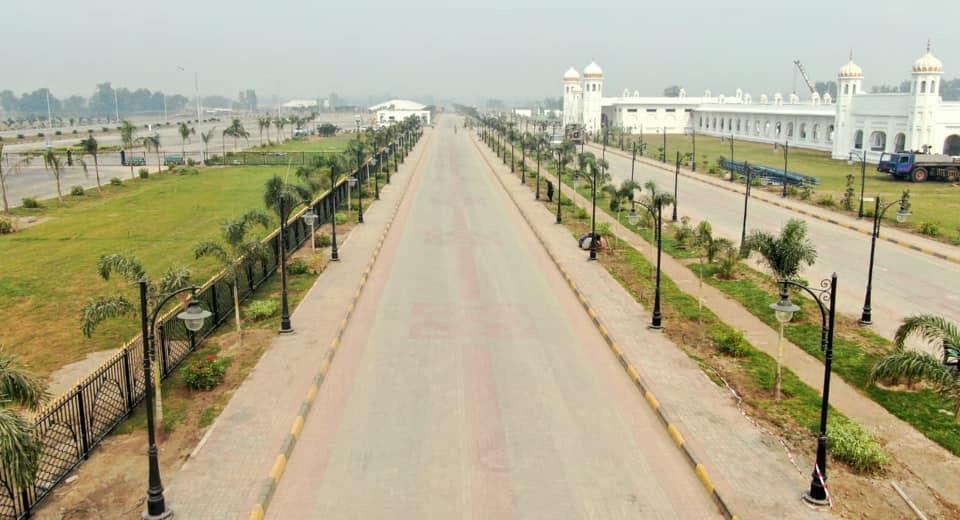
Gurdwara Darbar Sahib - From a 2-acre Gurdwara complex post-partition, originally 44 acres pre-partition to a 102 acre total covered area dedicated for the shrine and corridor. (AN Photo by Sib Kaifee)
India last week shared a list of 575 pilgrims, which also includes several MPs and MLAs from Punjab, who will be visiting the Kartarpur Sahib Gurdwara via the corridor to witness and participate in the inauguration ceremony.
Former Prime Minister Manmohan Singh, Punjab CM Amarinder Singh, Union Ministers Hardeep Puri, and Harsimrat Kaur Badal are among the 575 on the list to attend the inaugural “jatha” or group to Gurdwara Kartarpur Sahib.
Some 24 million Sikhs residing in India have waited for more than 70 years for consensus on the Kartarpur border crossing, hoping that the administrations in New Delhi and Islamabad would ultimately make it possible for them to perform their pilgrimage which now has come to fruition.
“You must visit your holy shrine – that God has given us a chance after 70 years and I pray to God that both countries coexist in a friendly way so we can give a good message to our children,” an overwhelmed female Indian citizen, who is visiting the shrine to pay homage to the founder of Sikhism, said while speaking to Arab News outside the Gurdwara.













